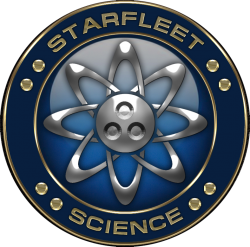Science: Difference between revisions
From Star Trek: Theurgy Wiki
Auctor Lucan (talk | contribs) No edit summary |
mNo edit summary |
||
| Line 1: | Line 1: | ||
[[File:Science.png|250px|right]] | [[File:Science.png|250px|right]] | ||
The Chief Science Officer was the Senior Staff member aboard a starship or starbase with the broad responsibility of coordinating the science department of the post. Science officers were responsible for observing and theorizing explanations for strange or seemingly unexplainable circumstances. In the 22nd and 23<sup>rd</sup> centuries, the science officer was responsible for sensor readings. | The Chief '''Science''' Officer was the Senior Staff member aboard a starship or starbase with the broad responsibility of coordinating the science department of the post. Science officers were responsible for observing and theorizing explanations for strange or seemingly unexplainable circumstances. In the 22nd and 23<sup>rd</sup> centuries, the science officer was responsible for sensor readings. | ||
A general survey party required the direction of the science officer. In a medical emergency, the findings of the science officer were heavily relied upon. | A general survey party required the direction of the science officer. In a medical emergency, the findings of the science officer were heavily relied upon. | ||
Revision as of 12:29, 13 June 2016
The Chief Science Officer was the Senior Staff member aboard a starship or starbase with the broad responsibility of coordinating the science department of the post. Science officers were responsible for observing and theorizing explanations for strange or seemingly unexplainable circumstances. In the 22nd and 23rd centuries, the science officer was responsible for sensor readings.
A general survey party required the direction of the science officer. In a medical emergency, the findings of the science officer were heavily relied upon.
The science officer was required to keep sufficient data. They were also required to supply the commanding officer with all reports, observations, and speculations that might have affected the safety of their vessel.
According to Jadzia Dax, it was a science officer's job to always have a "better idea." Source: Memory Alpha

